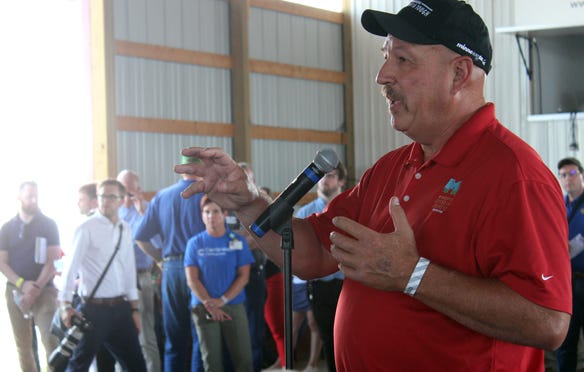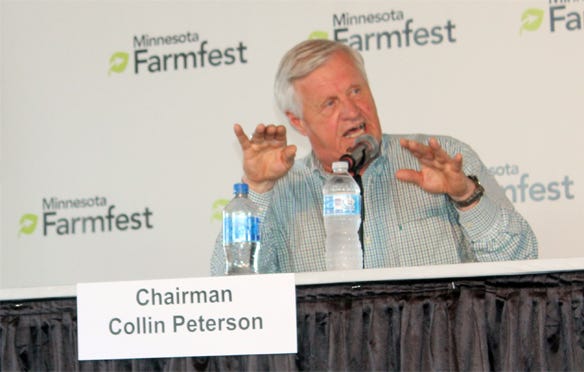
Agriculture Secretary Sonny Perdue defended the administration’s actions on trade during a listening session Aug. 7 at Farmfest held in Morton, Minn.
Trade and the farm economy dominated the 90-minute House Agriculture Committee listening session in the Wick Buildings Farmfest Center, which included several members of Minnesota’s congressional delegation along with Perdue. The crowd filled the bleachers in the building, with people spilling out the open doors.
Gary Wertish, president of the Minnesota Farmers Union, addressed what he called the elephant in the room with his question.
Farmers Union and many people agree with the president’s decision to look at trade agreements, he said, “but we disagree with the president’s go-it-alone approach, especially referring to China.”
China announced Aug. 5 it is not going to buy any agricultural products from the U.S., which will likely hit Minnesota farmers hard as China was the top export market for Minnesota soybeans and animal feed in 2018 and a leading destination for pork and dairy products, according to the Minnesota Department of Agriculture.
“This is causing long-term devastating damage not only to farmers, but rural communities,” Wertish said. “The market facilitation program payments, we greatly appreciate them, but that also is going to cause us long-term political damage.”
The payments are referred to as “farmer welfare,” he added.

TRADE QUESTIONS: Gary Wertish, Minnesota Farmers Union president, asked about the administration’s trade policy and the Market Facilitation Program payments. While the payments are appreciated, he said, “taxpayers aren’t going to stand for this and we as farmers, we need our markets back. We need prices.”

Farmers “need markets more than we need payments,” said Zippy Duvall, American Farm Bureau Federation President, later in the day after signing a banner at Farmfest in support of the U.S.-Mexico-Canada Agreement.
Duvall said farmers support the administration’s long-term attempt to fix trade policies, admitting that the pain is almost unbearable right now, but there are trade opportunities in other parts of the world.
“My concern is that we’ve asked the nation’s farmers to take a little bit of pain for a long-term gain [but] I see a lot of pain from the second congressional district of Minnesota,” said Rep. Angie Craig, D-Minn. “I don’t see a strategy in sight from the administration.”
China’s an offender, she said, but what are the next steps?
“Mr. Secretary, I’m rooting for you, the administration, to be successful, but I just want to tell you that I’m not sure how much longer our farmers can wait,” she said. “The trade assistance does not make them whole.”
Lincoln County farmer Joel Schreurs, who serves on the American Soybean Association board of directors and is also a Minnesota Soybean Growers Association director, said he’s concerned with the export market considering the ongoing trade war.

MARKET SHARE: Joel Schreurs, American Soybean Association and Minnesota Soybean Growers Association director and a farmer from Tyler, Minn., said he’s concerned about losing market share in China. “We worked a long time to develop these markets and we’re going to lose this market share,” he said. “It’s just not going to come back in a day or two, so how do we make this work?”

“The exports just aren’t going to be there,” he said. “We worked a long time to develop these markets and we’re going to lose this market share. It’s just not going to come back in a day or two, so how do we make this work?”
Perdue disagreed and said soybean producers became too reliant on one major customer. It’s not good business, he said, to depend on one customer for 60% of your sales.
He’s confident the U.S. will gain the Chinese market back. In the meantime, there are other customers in southeast Asia.
“Grains are fungible, China is going to buy where they can get the best value,” Perdue said. In addition, the administration is “working on markets in India, Thailand, Malaysia, around the world.”
He said the ball is now in China’s court.
“We want to continue talks,” he said. U.S. Trade Representative Robert Lighthizer and a delegation traveled to China at the end of July, and a Chinese delegation was expected to come to the U.S. in September. But while Lighthizer is negotiating, Perdue said the president is the chief negotiator and making a trade deal is his decision.
Other topics discussed by panel members included:
• Collin Peterson, U.S. House Agriculture Committee chairman, said he supports the USMCA and thinks it will pass.
“I told the administration on the U.S.-Mexico-Canada Agreement that as long as they maintained the ag stuff that was in NAFTA, and we didn’t go backwards, and they did no harm that I would support it,” he said. “When they came out with the agreement, they not only maintained what was in NAFTA, they improved it a little bit. I immediately came out in favor of it and I’ve done what I can to get other members of Congress to support it.”

HOW ABOUT USMCA: Peterson, House Agriculture Committee chairman, said he believes the U.S.-Mexico-Canada Agreement will be passed, but the back and forth between Speaker Nancy Pelosi and President Donald Trump is not helpful. His advice to get the agreement passed: “Don’t politicize it.”

• Colleen Moriarty, executive director of Hunger Solutions Minnesota, and Kim Guenther, communications director of the Minnesota Farmers Market Association, spoke in opposition to proposed changes to the Supplemental Nutrition Assistance Program.
Moriarty said the administration’s changes will result in 35,000 people in Minnesota losing their benefits, including 18,000 children and 3,000 people with disabilities. Guenther said customers spend their SNAP dollars at 99 farmer’s markets in Minnesota, and those dollars support local farmers. Last year, $620,000 in SNAP dollars was spent at Minnesota farmers markets, Guenther said.
• Peterson wants more participation in the dairy program in the 2018 farm bill.
“We only have 61% of dairy farmers in Minnesota signed up for new dairy program,” he said. “For the life of me, I can’t figure out why that’s not 100% because it’s a no brainer.”
The state of Minnesota is subsidizing the sign-up cost.
“We now have a guarantee of gross income for people that have 220 cows or less,” Peterson said. “If you’re in dairying and you’re not in this program and get in trouble, don’t come and talk to me because we’ve got the program there to help you make it through if we get into tough times.”
Kubat Willette is a Farm Progress digital content creator.
About the Author(s)
You May Also Like




